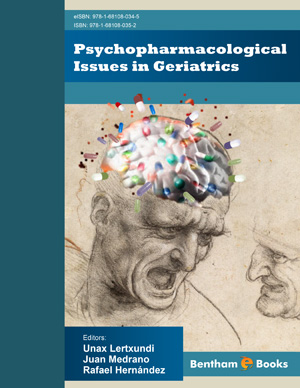Preface
Page: ii-iv (3)
Author: Anwar Khan*, Amalia bt Madihie* and Rehman Ullah Khan*
DOI: 10.2174/9789815274257124010002
PDF Price: $15
Acknowledgement
Page: v-v (1)
Author: Anwar Khan*, Amalia bt Madihie* and Rehman Ullah Khan*
DOI: 10.2174/9789815274257124010003
PDF Price: $15
Dedication
Page: vi-vi (1)
Author: Anwar Khan*, Amalia bt Madihie* and Rehman Ullah Khan*
DOI: 10.2174/9789815274257124010004
PDF Price: $15
An Introduction to Evidence-based Psychotherapies
Page: 1-13 (13)
Author: Anwar Khan*, Amalia bt Madihie* and Rehman Ullah Khan*
DOI: 10.2174/9789815274257124010005
PDF Price: $15
Abstract
Problem Domain: The landscape of psychotherapy is constantly evolving, with
practitioners seeking to align their methods with empirical evidence. However,
navigating the complexities of evidence-based psychotherapy requires a clear
understanding of its foundational principles and challenges.
Goal of this Chapter: This chapter aims to provide a comprehensive introduction to
evidence-based psychotherapy, elucidating its core concepts, addressing common
misconceptions, and exploring the challenges faced by practitioners and researchers in
this field. Subsequently, it delves into the three foundational components that underpin
this approach. The chapter also explores the robustness of evidence-based
psychotherapies by shedding light on their effectiveness and reliability in clinical
practice.
Selling Points and Contributions of this Chapter: By providing a precise definition
and elucidating the triad of evidence-based psychotherapy, this chapter serves as an
essential guide for both novice and experienced practitioners aiming to incorporate
evidence-based practices into their clinical endeavors. Specifically, this chapter has
made significant contributions in the following areas:
i) This chapter offers a concise yet comprehensive definition of evidence-based
psychotherapy, laying the groundwork for further exploration.
ii) It delves into the three foundational components of evidence-based psychotherapy,
this chapter provides readers with a nuanced understanding of its underlying principles.
iii) By debunking common misconceptions, this chapter promotes clarity and informed
decision-making among practitioners.
iv) By acknowledging and discussing the challenges faced by practitioners and
researchers, this chapter fosters dialogue and encourages innovative solutions.
Short Results:Through its exploration of the robustness of evidence-based
psychotherapies and its discussion of the challenges ahead, this chapter sets the stage
for further advancements in the field, ultimately aiming to enhance the quality and
effectiveness of psychotherapeutic interventions in clinical practice.
Evolution of Evidence-based Practices in Counseling Psychology
Page: 14-36 (23)
Author: Anwar Khan*, Amalia bt Madihie* and Rehman Ullah Khan*
DOI: 10.2174/9789815274257124010006
PDF Price: $15
Abstract
Problem Domain: Understanding the historical evolution of evidence-based
psychotherapy is crucial for contextualizing its current practices and future directions.
This chapter delves into the rich history and evolutionary journey of evidence-based
approaches within the realm of Counseling Psychology, shedding light on its origins,
development, and global perspectives.
Goal of this Chapter: The second chapter aims to provide a comprehensive overview
of the evolution of evidence-based psychotherapy, tracing its historical roots and
contextualizing its emergence within counseling psychology. By exploring topics such
as the history of evidence-based practice, the foundations of counseling psychology
preceding its advent, the timeline of evidence-based practice, and the progress achieved
in evidence-based practice across Asia, this chapter aims to acquaint readers with the
historical context of evidence-based psychotherapies.
Selling Points and Contributions of this Chapter: By offering insights into the
evolution and historical context of evidence-based approaches, this chapter provides
readers with a deeper understanding of the underpinnings and influences shaping
contemporary practices in Counseling Psychology. To be more precise, the following
are the areas where this chapter has significantly contributed:
i) This chapter offers a detailed exploration of the historical context surrounding
evidence-based psychotherapies, including the origins of evidence-based practice and
its integration into Counseling Psychology.
ii) By tracing the timeline of evidence-based practice and highlighting key milestones,
this chapter provides a comprehensive overview of its evolution, from inception to
present-day practices.
iii) In addition to examining the evolution of evidence-based practice in Western
contexts, this chapter explores its progress and adoption in Asia, particularly Pakistan,
offering insights into cross-cultural variations and implications.
iv) Through the exploration of historical and cultural factors, this chapter
contextualizes the development of evidence-based psychotherapies, enriching readers'
understanding of its diverse influences and trajectories.
Short Results: By acquainting readers with the historical context of evidence-based
psychotherapies and their evolution within Counseling Psychology, this chapter lays
the groundwork for further exploration and reflection on the past, present, and future of
evidence-based practices in psychotherapy.
Integration of Computer and Internet Technologies in Evidence-based Psychotherapies
Page: 37-50 (14)
Author: Anwar Khan*, Amalia bt Madihie* and Rehman Ullah Khan*
DOI: 10.2174/9789815274257124010007
PDF Price: $15
Abstract
Problem Domain: The integration of computer and internet technologies into mental
health sciences represents a significant advancement with profound implications for
diagnosis and treatment. Understanding the role of these technologies in modern
evidence-based psychotherapies is essential for leveraging their potential to enhance
mental healthcare delivery. One of the critical issues within this domain is the potential
lack of familiarity and understanding of these technologies among psychotherapists. If
psychotherapists are not adequately trained or educated about computer and internet
technologies, it can hinder their ability to leverage these tools effectively in diagnosis
and treatment.
Goal of this Chapter: The third chapter aims to explore the integration of computer
and internet technologies into the field of mental health sciences, with a particular
focus on their significance in the diagnosis and treatment of mental health problems.
By discussing various aspects such as the influence of computers and the internet on
modern evidence-based psychotherapies, the integration of computer technologies into
mental healthcare, and the relationship between Artificial Intelligence and digital
mental healthcare, this chapter seeks to provide readers with a comprehensive
understanding of the intersection between technology and mental health.
Selling Points and Contributions of this Chapter: By offering insights into the integration of computer and internet technologies into
mental health sciences, this chapter highlights their transformative potential in
revolutionizing mental healthcare delivery and improving patient outcomes. A few
contributions from this chapter are listed below:
i) This chapter explores how computers and the internet impact modern evidence-based
psychotherapies, shedding light on the role of technology in enhancing therapeutic
interventions and patient outcomes.
ii) By examining the integration of computer technologies into mental healthcare, this
chapter elucidates the evolving landscape of digital interventions and their implications
for clinical practice.
iii) This chapter delves into the relationship between Artificial Intelligence and digital
mental healthcare, exploring the potential synergies and challenges in leveraging AI for
improving mental health services.
iv) Its presentation of existing digital psychotherapeutic interventions and practical
recommendations for implementation, this chapter equips readers with valuable
insights and resources for incorporating technology into clinical practice.
Short Results: By providing an overview of the integration of computer and internet
technologies into mental health sciences and offering practical recommendations for
implementing digital psychotherapeutic interventions, this chapter paves the way for
the advancement of technology-driven approaches in mental healthcare, ultimately
aiming to enhance accessibility, effectiveness, and efficiency in delivering evidencebased psychotherapies.
Need for Cultural Adaptations in Evidence Based Psychotherapies
Page: 51-65 (15)
Author: Anwar Khan*, Amalia bt Madihie* and Rehman Ullah Khan*
DOI: 10.2174/9789815274257124010008
PDF Price: $15
Abstract
Problem Domain: Cultural adaptation of psychotherapy is a critical area within
evidence-based practice that addresses the complex interplay between culture and
mental health. Understanding the significance of cultural factors in psychotherapeutic
interventions is essential for ensuring their effectiveness and relevance across diverse
populations. One prominent issue is the lack of cultural competence among
psychotherapists, which may impede their ability to effectively engage with and
address the diverse cultural backgrounds of their clients. Additionally, there is a gap in
understanding the nuanced ways in which culture influences mental health beliefs,
behaviors, and help-seeking preferences. Failure to consider these cultural factors in
psychotherapeutic interventions can lead to disparities in access to and outcomes of
mental healthcare services. Moreover, the existing evidence base for culturally adapted
psychotherapies may be limited, highlighting the need for further research to validate
and refine these interventions across diverse populations.
Goal of this Chapter: The fourth chapter delves into the cultural adaptation of
psychotherapy, aiming to elucidate the importance of cultural considerations in
evidence-based psychotherapies. Through a comprehensive exploration of cultural
frameworks and the process of cultural adaptation, this chapter seeks to equip readers
with the necessary understanding and skills to navigate cultural diversity in
psychotherapeutic practice.
Selling Points and Contributions of this Chapter: By highlighting the centrality of
cultural adaptation in evidence-based psychotherapies, this chapter serves as a guiding
compass for practitioners and researchers, emphasizing the indispensable role of
cultural sensitivity and responsiveness in delivering effective mental healthcare. In
particular, the following are some notable contributions this chapter has made:
i) This chapter provides a nuanced examination of the concept of culture, unpacking its
multifaceted layers and exploring its relevance in the context of evidence-based
psychotherapies.
ii) By delving into the process of cultural adaptation, this chapter underscores its
pivotal role in ensuring the applicability and efficacy of psychotherapeutic
interventions across diverse cultural contexts.
iii) The chapter navigates through the necessary prerequisites for cultural adaptations
within evidence-based psychotherapies, highlighting the critical considerations and
steps involved in this process.
iv) Through a thoughtful discussion, this chapter examines the challenges encountered
during the implementation of culturally adapted evidence-based psychotherapies,
offering insights into potential barriers and strategies for overcoming them.
v) Finally, the chapter explores the elements that may ultimately determine the success
of culturally adapted evidence-based psychotherapies, shedding light on key factors
contributing to their effectiveness and sustainability.
Short Results: In summary, this chapter serves as a comprehensive guide to
understanding the process of cultural adaptations in evidence-based psychotherapies.
By emphasizing the evident necessity for such adaptations and providing insights into
their implementation and evaluation, this chapter empowers readers to navigate the
complexities of cultural diversity in psychotherapeutic practice effectively.
Methodologies for Cultural Adaptation of Evidence Based Psychotherapies
Page: 66-77 (12)
Author: Anwar Khan*, Amalia bt Madihie* and Rehman Ullah Khan*
DOI: 10.2174/9789815274257124010009
PDF Price: $15
Abstract
Problem Domain: This chapter revolves around the selection and implementation of
research methodologies for the cultural adaptation of evidence-based psychotherapies.
One significant challenge is the lack of consensus on the most effective methodologies
for conducting culturally sensitive research in this domain. This gap in understanding
may result in inconsistencies in study designs, data collection procedures, and data
analysis approaches, ultimately hindering the validity and reliability of research
findings. Additionally, there is a need for guidance on navigating the complexities of
adapting evidence-based psychotherapies to diverse cultural contexts, as well as a lack
of resources and frameworks to support researchers and practitioners in this endeavor.
Goal of this Chapter: The fifth chapter maintains a technical focus as it outlines the
different research methodologies employed in the cultural adaptation of evidence-based
psychotherapies. By providing critical insights into methodologies for cultural
adaptation, such as the selection of study designs and procedures, data analysis
approaches, and the various stages involved in modifying treatment protocols, this
chapter aims to equip readers with the necessary tools and strategies for conducting
rigorous and culturally sensitive research in this field.
Selling Point and Contributions of this Chapter: This chapter offers a comprehensive
overview of the arduous process of adapting evidence-based psychotherapies,
emphasizing the synthesis of science and culture. By highlighting the importance of
research methodologies in cultural adaptation, this chapter serves as a valuable
resource for researchers and practitioners seeking to enhance the cultural relevance and
effectiveness of psychotherapeutic interventions. This chapter offers insightful
information about the methodological aspects of the cultural adoption of evidencebased psychotherapies:
1) Selection of Study Designs and Procedures: This chapter provides guidance on
selecting appropriate study designs and procedures for conducting culturally sensitive
research in the adaptation of evidence-based psychotherapies, emphasizing the
importance of methodological rigor and cultural sensitivity.
2) Data Analysis Approaches: By discussing various data analysis approaches, this
chapter offers insights into analyzing and interpreting research findings within diverse
cultural contexts, enhancing the validity and generalizability of study results.
3) Modification of Treatment Protocols: The chapter navigates through the various
stages involved in modifying treatment protocols to accommodate cultural diversity,
highlighting key considerations and strategies for ensuring cultural relevance and
effectiveness of adapted interventions.
Short Results: In summary, this chapter offers a thorough overview of the
methodologies for cultural adaptation of evidence-based psychotherapies, providing
valuable insights and guidance for researchers and practitioners alike. By bridging the
gap between research and practice, this chapter contributes to the advancement of
culturally sensitive psychotherapeutic interventions, ultimately aiming to improve
mental health outcomes for diverse populations.
Status of Evidence-based Mental Healthcare Counseling System in Pakistan
Page: 78-89 (12)
Author: Anwar Khan*, Amalia bt Madihie* and Rehman Ullah Khan*
DOI: 10.2174/9789815274257124010010
PDF Price: $15
Abstract
Problem Domain: This chapter discusses the challenges and gaps in the evidencebased mental healthcare counseling system in Pakistan. Despite growing recognition of
mental healthcare in the country, significant hurdles impede the effective provision of
evidence-based psychotherapies and counseling services. These obstacles include
limited resources, inadequate infrastructure, and cultural stigmatization surrounding
mental health, which collectively hinder access to quality mental healthcare
interventions for Pakistani individuals. Furthermore, there is a notable lack of
awareness and understanding of evidence-based practices among mental health
professionals and policymakers, exacerbating the disparities in mental healthcare
access and quality across the country.
Goal of this Chapter: The sixth chapter specifically focuses on discussing the
important aspects of evidence-based mental healthcare counseling systems and the
effectiveness of evidence-based psychotherapies in Pakistan. By providing insights into
the complex dynamics of the Pakistani mental healthcare system, this chapter aims to
educate readers on the challenges and opportunities in improving mental healthcare
delivery in the country.
Selling Points and Contributions of this Chapter: This chapter offers a comprehensive
overview of the status of evidence-based mental healthcare counseling systems in
Pakistan, highlighting the need for enhanced resources, infrastructure, and awareness to
address the growing mental health needs of the population. By shedding light on the
effectiveness of evidence-based psychotherapies in the Pakistani context, this chapter
serves as a valuable resource for policymakers, healthcare providers, and researchers
seeking to improve mental healthcare outcomes in the country. More specifically, this
chapter has made a substantial contribution in the following ways:
i) This chapter assesses the current status of evidence-based mental healthcare
counseling systems in Pakistan, identifying key challenges and opportunities for
improvement.
ii) By evaluating the effectiveness of evidence-based psychotherapies in the Pakistani
context, this chapter provides insights into the applicability and relevance of these
interventions in addressing mental health issues in the country.
iii) The chapter offers recommendations for enhancing the effectiveness and
accessibility of evidence-based mental healthcare counseling systems in Pakistan,
including strategies for increasing awareness, building capacity, and improving
infrastructure.
Short Results: In summary, this chapter serves as a crucial resource for understanding
the status of evidence-based mental healthcare counseling systems in Pakistan. By
identifying key challenges and opportunities, and offering recommendations for
improvement, this chapter contributes to ongoing efforts to strengthen mental
healthcare delivery and improve outcomes for individuals with mental health issues in
Pakistan.
Cultural Adaptations of Evidence Based Psychotherapies in Pakistan: A Case Illustration
Page: 90-122 (33)
Author: Anwar Khan*, Amalia bt Madihie* and Rehman Ullah Khan*
DOI: 10.2174/9789815274257124010011
PDF Price: $15
Abstract
Problem Domain: The last chapter of this book addresses the practical challenges and
complexities involved in culturally adapting evidence-based psychotherapies to the
cultural setting of Pakistan. One significant challenge is the lack of practical guidance
on how to adapt treatment protocols effectively while considering the cultural nuances
and sensitivities specific to Pakistan. Additionally, there is a notable gap in
comprehensive information regarding the cultural adaptation of specific treatment
protocols, such as Eye Movement Desensitization and Reprocessing and CognitiveBehavioral Therapy, for addressing prevalent mental health issues in Pakistan,
including post-traumatic stress disorder, anxiety, and depression. Moreover, there is
limited research on the efficacy and feasibility of culturally adapted treatment protocols
in real-world settings within the Pakistani context, leaving a gap in understanding the
practical implications and outcomes of these interventions.
Goal of this Chapter: The last chapter of this book aims to provide readers with a
concrete grasp of the complete process of culturally adapting evidence-based
psychotherapies in Pakistan. Through a practical case illustration, this chapter offers
insights into the methods for cultural adaptation of treatment protocols and presents the
results of an experiment on cultural adaptation conducted in Pakistan. The last chapter
has endeavored to address the previously mentioned research gaps by furnishing
readers with a solid understanding of the entire process involved in culturally adapting
evidence-based psychotherapies within the context of Pakistan.
Selling Points and Contributions of this Chapter: This chapter serves as a valuable
resource for practitioners and researchers seeking to enhance the efficacy and cultural
relevance of psychotherapeutic interventions in Pakistan. By offering a practical
demonstration of the cultural adaptation process and presenting experiment results, this
chapter provides actionable insights for improving mental healthcare delivery in the
country. This chapter has augmented the existing body of knowledge in the following
ways:
i) The chapter presents a practical scenario illustrating the complete process of
culturally adapting evidence-based psychotherapies in the cultural setting of Pakistan
by providing readers with a detailed understanding of the adaptation process.
ii) Thorough information is provided on the cultural adaptation of treatment protocols
of Eye Movement Desensitization and Reprocessing and Cognitive-Behavioral
Therapy for addressing Post-Traumatic Stress Disorder, anxiety, and depression in
Pakistan, highlighting the importance of tailoring interventions to meet the cultural
needs of the population.
iii) The chapter unveils the outcomes of a randomized controlled trial conducted on
cultural adaptation in Pakistan, providing valuable insights into the effectiveness and
viability of modified treatment protocols in practical settings. The results of this trial
have yielded significant insights, manifesting in the development of translated
assessment tools like CAPS-5 and culturally adapted trauma-focused psychotherapy
protocols. These customized tools and protocols hold promise for utilization by
subsequent researchers in Pakistan.
Short Results: In summary, this chapter offers a practical demonstration of culturally
adapting evidence-based psychotherapies to the cultural settings of Pakistan by
providing valuable insights into the translation of treatment protocols and their efficacy
in addressing mental health issues prevalent in the country.
APPENDIX A
Page: 123-139 (17)
Author: Anwar Khan*
DOI: 10.2174/9789815274257124010012
PDF Price: $15
APPENDIX B1
Page: 140-190 (51)
Author: Anwar Khan*
DOI: 10.2174/9789815274257124010013
PDF Price: $15
APPENDIX B2
Page: 191-198 (8)
Author: Anwar Khan*
DOI: 10.2174/9789815274257124010014
PDF Price: $15
APPENDIX B3
Page: 199-202 (4)
Author: Anwar Khan*
DOI: 10.2174/9789815274257124010015
PDF Price: $15
APPENDIX C
Page: 203-224 (22)
Author: Anwar Khan*
DOI: 10.2174/9789815274257124010016
PDF Price: $15
Subject Index
Page: 225-230 (6)
Author: Anwar Khan*
DOI: 10.2174/9789815274257124010017
PDF Price: $15
Introduction
Cultural Adaptation of Evidence-Based Psychotherapies for Common Mental Health Disorders in Pakistan offers a comprehensive overview of practical psychotherapy in a Pakistani cultural context. The authors aim to bridge knowledge gaps for practitioners who may be familiar with conventional methodologies and want to understand the subject from a regional perspective. The content includes seven meticulously written and referenced chapters that start with an overview of evidence-based therapy, progressing to modern psychotherapy techniques. The book concludes with information intended to guide the reader to adapt psychotherapy practices in Pakistani cultural settings. Key Features · Provides an introductory overview of evidence-based psychotherapy · Provides an overview of psychotherapy practice in Pakistan · Covers advanced technologies used in psychotherapy like Eye Movement Desensitization and Reprocessing, and Cognitive Behavioral Therapy to effectively address conditions such as post-traumatic stress disorder, depression, and anxiety · Suggests culturally sensitive methodologies for practitioners working in Pakistani communities This book is an ideal reference for clinical psychology researchers, psychotherapists, mental health counselors, academicians, and students. The insights in the book are invaluable, not only for Pakistani readers but also for those across Asia, providing a comprehensive blueprint for culturally adapting psychotherapies to diverse contexts.
















